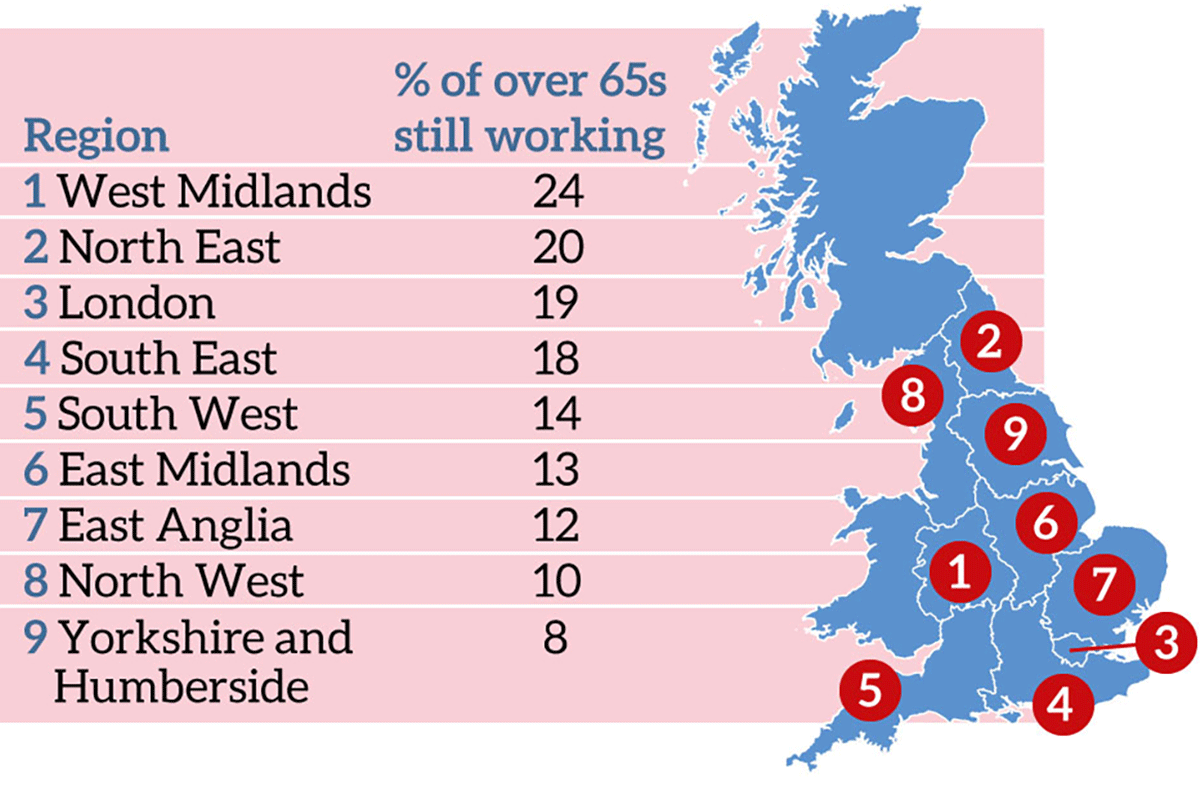One in seven over-65s is in work - and numbers rise as coronavirus hits incomes
Research shows one in seven people aged 65 or above is working
26th May 2020 14:05
by Stephen Little from interactive investor
Research shows one in seven people aged 65 or above is working.

Many people dream of having a relaxing retirement and being able to spend more time with our loved ones. However, increasing numbers of people are working once they hit retirement age.
One in seven people aged 65 or over is still working - more than half of whom are working full time or are self-employed, new figures show.
Four out of 10 work part time, while one in five have two jobs or more.
Insurer Sunlife questioned over 3,000 people aged above 50 for its Finances After 50 report.
It found that the number of people working in their retirement varies across the UK.
The West Midlands has the highest number of over-65s working - one in four. It is followed by the North East and London, with one in five.
However, just one in 12 people aged over 65 are working in Yorkshire and Humberside.
Over-65s still working in the UK

Source: Sunlife, May 2020
Benefits of working in retirement
Sunlife found that those who continue to work past 65 are better off financially.
Those over 65 who are still working have a monthly income of £2,688 - £715 more than those who are retired or not working.
This means they have more cash to spend each month (£466) than those who are retired or not working (£185).
Working over-65s are also more likely to have a private pension and have more in their pot than those who are retired or not working (£177,560 on average compared to £120,682) – most likely because they are either not drawing from it yet, or are drawing less.
They are more likely to have twice as much saved as over-65s who are retired or not working - £119,211 compared to £64,455.
Simon Stanney, equity release director at SunLife, says: “Our research reveals that those still working are the most concerned, despite being in what would appear to be a much stronger financial position.
“Obviously we do not know what type of lifestyle in retirement these people are hoping to have, which could well be behind their fears that they will not have sufficient income to support it.”
Why are people working in retirement?
The number of over-65s in work has increased by 188% in the last 20 years from 455,000 to 1.31 million, according to data from the Office for National Statistics.
One reason people are continuing to work once they retire is because of they want to top up their pension pots while they still can.
Sunlife's research found that 40% of those over 65 are having to work in retirement because they do not think their savings, investments and pensions will provide them with enough income.
Another reason people continue to work is because of the wellbeing benefits and contact with other people.
However, despite the benefits of working in retirement, critics say it highlights the problem of pensioner poverty.
Although poverty levels are lower that they were 20 years ago, two million of pensioners in the UK live in poverty and numbers have started to grow in recent years, according to Age UK.
Impact of coronavirus
Separate research suggests that the number of people working past 65 could increase even further because of the coronavirus pandemic.
According to Legal & General Retail Retirement, four out of 10 people over 50 are planning to delay retirement by three years or carry on working indefinitely as a result of the pandemic.
Chris Knight, chief executive of Legal & General Retail Retirement, says: “The financial impact of the Covid-19 pandemic seems to be particularly pronounced for people aged over 50 who are still in work.
“While some people will choose to work for longer, or indefinitely, the key consideration when it comes to this research is that it seems this decision has been driven by the financial impact of the pandemic, rather than personal choice."
Can you still draw your state pension if you work in retirement?
If you continue to work in retirement you can still draw your state pension. It is counted as income and taxable as a result.
If you want to it is possible to put claiming your pension off until a later date. If you postpone your pension you will receive a higher amount to make up for when you did not claim.
How much income do you need in retirement?
The amount you need for a comfortable retirement depends on your lifestyle.
Typically, experts suggest aiming for around half to two-thirds of your salary, as your costs will probably fall. Retirees have often paid off mortgages and will not have to contend with commuting costs, for example, or the costs of raising children.
According to consumer group Which?, retired households spend around £26,000 a year on average, which covers basic spending, including utilities, and a few luxuries, such as hobbies and European holidays. However, this rises to £39,000 if you plan on long-haul trips, for example.
There are plenty of online retirement calculators that can help work out how much you need to save, and how much you might need.
This article was originally published in our sister magazine Moneywise, which ceased publication in August 2020.
These articles are provided for information purposes only. Occasionally, an opinion about whether to buy or sell a specific investment may be provided by third parties. The content is not intended to be a personal recommendation to buy or sell any financial instrument or product, or to adopt any investment strategy as it is not provided based on an assessment of your investing knowledge and experience, your financial situation or your investment objectives. The value of your investments, and the income derived from them, may go down as well as up. You may not get back all the money that you invest. The investments referred to in this article may not be suitable for all investors, and if in doubt, an investor should seek advice from a qualified investment adviser.
Full performance can be found on the company or index summary page on the interactive investor website. Simply click on the company's or index name highlighted in the article.